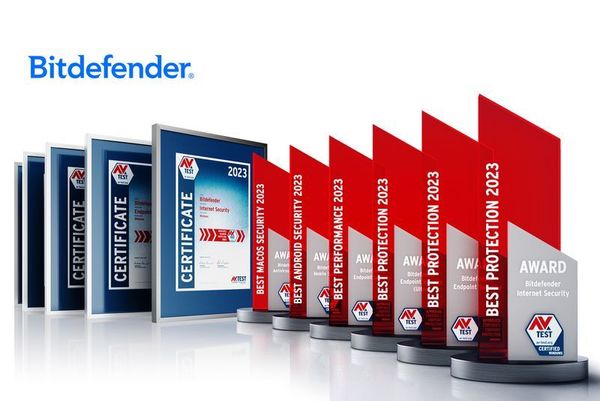BitDefender Product Impersonated by Rogue AV
Essai gratuit de 30 jours

Unlike average rogue AV products, the ByteDefender sibling does not rely on the classic drive-by method used by most products of its kind, but rather piggybacks on the popularity of the BitDefender products and their distinct visual identity to lure users into voluntarily downloading it. The website distributing it is located at hxxp://www.bytedefender.in (URL specifically invalidated to avoid accidental infection) and abusively built using the BitDefender layout. The domain name has been registered in Ukraine. Even the boxshots have been crafted in such a manner to trick the user into thinking that they are installing the genuine security product.
The infection scenario is simple, yet efficient: the user looking for a BitDefender product may typo-squat the genuine address and gets redirected to the malicious webpage. Because of the similar webpage structure, the user may download and install the rogue AV
Once installed on the system, this piece of scareware would start popping out fake infection alerts in an attempt at pursuing the user into purchasing the “full version” and get rid of the mentioned threats.
Figure 1: “infections found” during the scan process
Figure 2: “Infection” report
Figure 3: Buy now
Interesting enough, the payment processor for the ByteDefender Rogue AV is the trustworthy company Plimus, who has suspended sales on grounds of abuse.
“Cyber-criminals know no boundaries when it comes to distributing and marketing their rogue security products. Sensational events, Trojanized applications or websites and carefully forged – yet useless – ‘security products’ are only a few of the multitude of methods to capitalize on unwary users”, said Catalin Cosoi, senior Researcher at BitDefender.
As for the technical part, the ByteDefender rogue AV is shielded by a modified UPX packer with multiple layers of obfuscation that not only that deters static analysis, but also prevents it from running inside a virtual machine. It unsuccessfully tries to kill Windows services known to belong to specific AV vendors, thus opening a door for its own files.
BitDefender has added protection against the new threat (detected as Trojan.FakeAV.KZO) and has released a free removal tool to automatically clean infected computers of users that are not running BitDefender security products.
In order to stay safe, BitDefender® recommends that you download, install and update a complete antimalware suite with antivirus, antispam, antiphishing and firewall protection and to manifest extra caution when prompted to open files from unfamiliar locations.
tags
Auteur

Bogdan s'épanouit chez Bitdefender en tant que directeur de la recherche sur les menaces
Voir toutes les publicationsActualités Les + populaires
Qu'est-ce que l'empreinte numérique et pourquoi les pirates veulent-ils la vôtre?
Avril 13, 2023
Microblogging, désinformation et risques pour la vie privée
Mars 21, 2023
FOLLOW US ON SOCIAL MEDIA
Vous pourriez également aimer
Marque-pages














